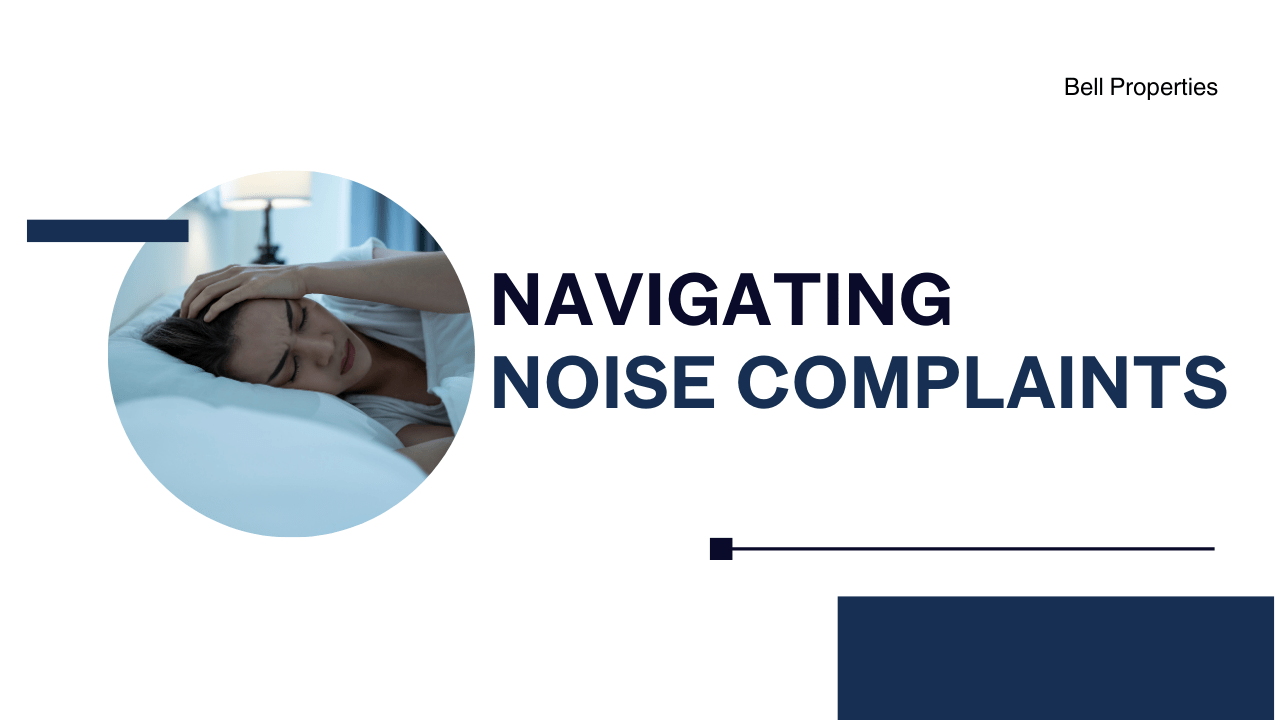Managing noise in California isn’t really easy. Large cities Iike Los Angeles, San Francisco, and San Diego are all home to a lot of people. In a single-family home, tenants enjoy a generally private environment where neighbors really have to be loud in order to inspire a complaint. In apartment buildings, however, noise complaints are always coming in from frustrated tenants who don’t like hearing their neighbors, their neighbor’s pets, or their neighbor’s guests.
Dealing with noise complaints from tenants? Let us handle it. Contact Bell Properties.
Landlords who are renting out units in a building or even a duplex or a triplex may spend too much time managing disputes between tenants who share walls, hallways, and common areas. Everyone has a different threshold for the amount of noise they notice and can handle. Some tenants can sleep through a raging party or a crying baby right upstairs or next door. Other tenants will have trouble with a barking dog from several doors down.
Generally, we expect adults to handle their own conflicts, but we’re here as a resource when problems need to be solved between tenants, especially when noise is the issue.
Wondering about the best way to deal with these complaints?
Contact us for a free consultation.
And, pay attention to these steps, which we typically take when dealing with noise complaints.
It Starts with Lease Agreements

We have a plan for complaints around noise.
A good noise policy starts with established rules in the lease agreement. By including quiet hours, a noise policy, and a plan for resolving issues, we know that our lease agreements have all of our procedures and requirements documented in the lease and available to tenants.
For example, a quiet hours policy will let all tenants know that noise won’t be tolerated from 10:00 p.m. until 8:00 a.m., or from 9:00 p.m. until 7:00 a.m., whatever is decided. Leases can explain the purpose of those quiet hours; that they exist to eliminate disturbances for all tenants in the building.
Including a policy on quiet hours establishes expectations. Noise complaints that come in during those stated quiet hours will be a clear violation of the lease agreement, and we will be able to back up any actions that we have to take against the tenant who is making too much noise.
Not all noise complaints will violate the quiet hours policy, but it’s a good place to start. Our lease can also put forth the expectation that tenants are respectful to their neighbors when it comes to music, television, guests or parties, and pets.
Wondering if your lease includes such policies? Let us take a look.
Document All Noise Complaints at California Rental Properties
 We are willing to listen when a tenant has a complaint about noise. The tenant who is filing a noise complaint with us usually just wants to be heard. We won’t ignore their dilemma or act like it’s not a big deal. If it’s impacting their happiness and they’re paying rent in one of our rental properties, it is a big deal.
We are willing to listen when a tenant has a complaint about noise. The tenant who is filing a noise complaint with us usually just wants to be heard. We won’t ignore their dilemma or act like it’s not a big deal. If it’s impacting their happiness and they’re paying rent in one of our rental properties, it is a big deal.
Active listening is a skill we think landlords would do well to sharpen. By listening to tenants and providing support for what they’re going through, we maintain a positive and professional relationship with our residents. We show them that we care about their comfort and the quiet enjoyment of their property that they deserve.
When multiple complaints from different tenants in a building come in about the same noise or the same tenant who is making the noise, those tenants have a stronger argument. It’s especially important to pay attention and listen.
Document everything, no matter who is complaining or what the problem is.
Let us handle the hassle of these noise complaints from tenants. At Bell Properties, we start by gathering the following information:
Where the noise is coming from. Is there a specific apartment that is the problem? The complaining tenants will likely report exactly who it is, and we will confirm this and include it in our notes. It’s a lot more difficult to respond to complaints about loud music “upstairs” or barking dogs “down the hall.” We look for specifics.
When did the noise occur? If the problem occurred one time and seems not to be an issue anymore, there’s likely not a lot that we will need to do except document the problem in case it does happen again. If the problem is a recurring issue, we document that.
What kind of noise is the tenant hearing? Typical noise complaints are loud pets, loud people, music and television, or loud parties. If it’s something outside of another tenant, we will have a different problem to contend with. Loud landscapers at 7:00 in the morning, for example, might be an easier fix or a more complicated one.
Has anyone reached out to the tenant to communicate about the problem? We will ask if there has been any kind of communication with the tenant making too much noise.
The more information tenants can provide in their noise complaint report, the better. Details are important and will help as we move through the process of addressing the noise and ensuring it does not continue to cause a disturbance at the rental property.
Tenant Communication: How to Talk to a Noise Maker

Communication is always important, and if one neighbor is being too loud for the other residents in a building, a simple and non-confrontational discussion can sometimes take care of the problem pretty quickly. If our tenants are comfortable talking to their neighbors, we encourage them to do so. We recommend that they not be accusatory or angry, but to approach it in a way that’s respectful and open.
It’s possible that the neighbors don’t realize how easy it is for other tenants to hear them. If they’re reasonable and respectful, a simple chat may be all that’s required, and things will quiet down right away.
Not all tenants will feel comfortable with this, however, and we don’t want an already tense situation to escalate.
We might reach out to the tenant ourselves and ask them to be more mindful of their noise. Or we will immediately put things in writing, letting the tenant know that we’ve received complaints about noise. We include the details of the noise reports and highlight the lease section that addresses noise and expectations of quiet.
Opening a discussion on noise and respecting each other’s quiet times is something we can facilitate as California property managers. If tenants are nervous about talking to their neighbors because they’re combative or difficult, it might be up to us to have the conversation.
Taking the Next Steps: Enforcing the Lease
 What if a conversation has taken place, but there are still noise complaints coming in?
What if a conversation has taken place, but there are still noise complaints coming in?
Contact us at Bell Properties. This is not an escalation any landlord or tenant should manage on their own.
Police can get involved if there’s some kind of an issue that’s threatening a person’s safety. Police have also been called to break up parties that have gotten out of hand.
We can also begin an eviction, but police and evictions are things we want to do only if the tenant is completely uncooperative and unwilling to comply with the lease agreement and turn down the noise.
In California, lease violations are a just cause for eviction. But don’t pursue an eviction without support from Bell Properties. Contact us for a free consultation.
We can serve the property notices and file the unlawful detainer. We’ll make sure the court has a copy of the lease, evidence of the lease violation, and copies of the notice we served as well as any correspondence related to the violation.
After filing the lawsuit, the tenant must be served with court papers. California law requires a neutral third party to serve the documents, which typically include the complaint and summons. This step is crucial as improper service can delay the eviction process.
Once the tenant has been served, the court will schedule a hearing. During the hearing, both parties will have the opportunity to present their case. It is vital to have all necessary documentation and evidence ready to support your claim.
If the court rules in our favor, we will receive a judgment and a Writ of Possession. This document authorizes the sheriff to remove the tenant from the property if they have not vacated by the deadline set by the court.
Working with Bell Properties

Peace of mind comes with a partnership that includes qualified California property managers. We know it’s difficult to mediate these disputes. But remember that there’s an easy answer: a quick call to Bell Properties. Then, the problem is no longer yours. Leave this hassle to us.
There are many ways that we can deal with loud tenants and tenants who are likely to complain about the noise in their building. We will deliver a strong lease that protects the quiet in a building.
We can help. Don’t deal with tenants who are not respectful of their neighbors. Instead, contact us at Bell Properties.


